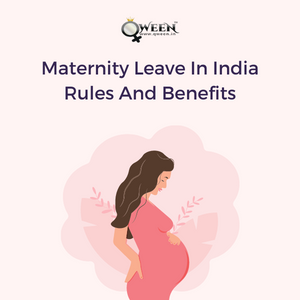

We live in a modern era, where not only men but women are also an active part of the workforce of India. But one reality that can't change is natural phenomena that every woman has to go through, such as the menstrual cycle and pregnancy. Just like every female, working mothers also have to be with their children and care for them, and even government is well attentive to this fact.
And that's why the government of India has introduced so many laws and amendments to safeguard the women's community and their rights. Amidst those many laws, there is a specific amendment established for working mothers and "would be" working mothers, known as The Maternity Benefit Act 1961.
This policy is specifically introduced for working women who are mothers or going to be mothers. Every working woman needs to be aware of this Act, as most women can't take advantage of this privilege because of their unawareness.
When it comes to maternity leave policy, there are plenty of questions that come into one's mind like:
And many more.
To answer your questions we have done some research regarding maternity leave policy in India. But, let's first understand the "The Maternity Benefit Act 1961".
The Maternity Benefit Act 1961
The Maternity Leave Act was first introduced in 1961 by N.M Joshi. The main aim of this Act is to protect women and their employment rights during their pregnancy journey.
Initially, the prime reason behind the establishment of this Act was to safeguard the health of mothers and child by supporting them with financial support for medical and nursing care. But now, an add-on to the existence of this Act is to secure their employment and economic rights.
Maternity leave in India refers to a paid leave benefit that a pregnant woman employee can take from her company for a particular period of time to take care of her newborn baby without losing their job.
An expecting working mother can take leave before, during, and after the delivery. In 2017 there were few modifications made to the pre-established Act to accommodate the alternating social and economic dynamics in the world.
The Maternity Benefit Amendment Act 2017 was passed by Rajya Sabha in 2016 and later on also got sanctioned by Lok Sabha in 2017.
Some important adjustments done under Maternity Benefit Act 2017 are:
Maternity leave rules, benefits, and applicability:
The maternity leave is applicable to:
Maternity leave rules and benefits under the Act are:
Bonus: How to write a maternity leave application (Sample)
A Maternity leave application can be sent to the employer either as a letter or an email.
Sender’s name
Address.
Date: xx-xx-xxxx
To,
Receiver’s name,
Address.
Subject: Application for maternity leave
Dear Mr. /Mrs. (Name of the receiver),
I am (your name) working as (Job role) at (Department you are working on).
I am writing to inform you that I have been pregnant since last (No. of months), and now I am seeking to take allotted maternity leave of (No. of weeks/months) as suggested by the doctor.
I plan to start my maternity leave from (Starting date) and join the office by (Joining date), excluding any unanticipated issues concerning my pregnancy and delivery.
I hope this request will be allowed. Since I will be gone for a long period, I have assigned my responsibilities to my colleague (Colleague’s name). In case of any emergency, please contact me at (Contact Info).
Thank you for your time and consideration. I look forward to your positive reply.
Yours sincerely,
(Your name)
Final Thoughts
Pregnancy is an instinctive process that every woman has the right to experience. It is a very joyous and happy moment of life for the mother and the whole family. With these Maternity leave benefits, every woman can experience this god's gift without quitting their job.
But if you are a full-time mom and looking for work-from-home job opportunities, you should really check out Qween. We help women become financial independent by providing them flexible jobs along with upskilling training and mentorship opportunities.
Disclaimer - This blog is not intended nor should it be construed as a source of medical advice, diagnosis, or treatment, and should not be considered a replacement for similar materials.
More To Read
Top 8 Women Communities That Every Woman Must Join
Admin
0 Comments
4598 Views
To be the most preferred networking platform for women to help them cooperate, collaborate & grow together.